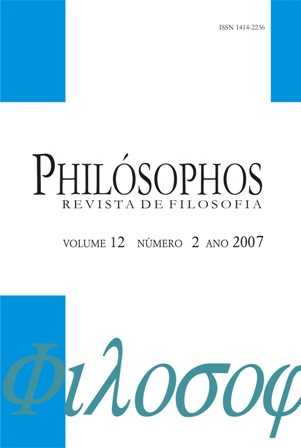ONTOLOGICAL SUBJECTIVITY IN JOHN SEARLE'S PHILOSOPHY OF MIND
DOI:
https://doi.org/10.5216/phi.v12i2.3386Keywords:
subjectivity, dualism, mind-body problemAbstract
This paper contains an analysis of a famous criticism from John Searle on materialist tradition. This tradition uses to ignore or even refuse the subjectivity of mental phenomena. This paper examines Searle’s strategy to defend this subjectivity, refusing the essential character of behavior to the mental aspect (section II), distinguishing subjective and objective in epistemic and ontological senses (section III) and showing his solution to the problem of other minds (section IV). However, his attempt to obtain an indirect access to subjective mental phenomena through causal explanations (section V) of these phenomena by brain processes is not enough to integrate the ontological subjectivity in our scientific worldview, once that this supposed ontological irreducibility from subjective to objective phenomena seems to result in the conclusion that mental phenomena are something beyond natural reality.Downloads
Downloads
Published
How to Cite
Issue
Section
License
Authors who publish in this journal agree to the following terms:
- Authors retain copyright and grant the journal right of first publication, with the work simultaneously licensed under a Creative Commons Attribution License that allows others to share the work with an acknowledgement of the work's authorship and initial publication in this journal.
- Authors are authorized to enter into separate, additional contractual arrangements for the non-exclusive distribution of the journal's published version of the work (e.g., publishing in an institutional repository or as a book chapter), with an acknowledgement of its authorship and initial publication in this journal.















